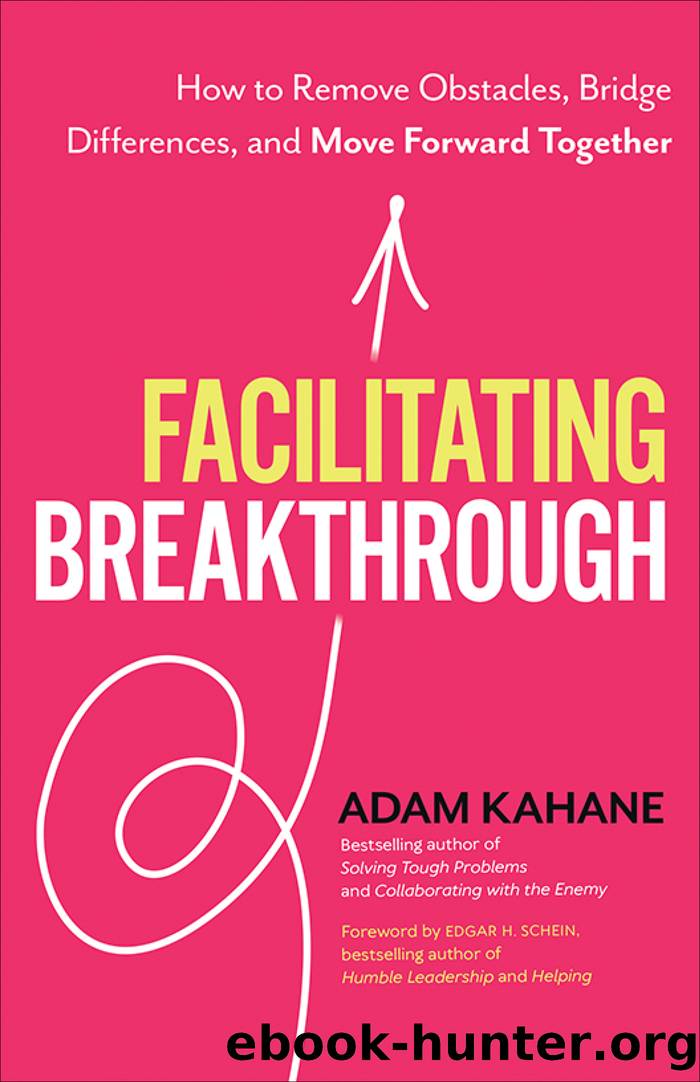Facilitating Breakthrough by Adam Kahane

Author:Adam Kahane
Language: eng
Format: epub
Publisher: Berrett-Koehler Publishers
PROGRESS INVOLVES FAILING
In November 2015, during the first workshop of the Possible Mexicos project, our facilitation team had a fierce argument. In 2014, Mexico had been rocked by a series of corruption scandals and massacres, and hundreds of thousands of people had taken to the streets in protest. A group of committed citizens got together to organize an ambitious multi-stakeholder process to find ways to deal with this nexus of âthe three Iâsâ: illegality, insecurity, and inequity. They engaged Reos to help facilitate this process.
This first workshop brought together a group of thirty-three national leaders: politicians, human rights activists, army generals, business owners, religious leaders, trade unionists, intellectuals, and journalists. The facilitation team consisted of twelve Mexican organizers and five Reos staff members. The Reos team had mapped out a complicated agenda for the workshop, which involved both an innovative sequence of plenary and breakout conversations and also a set of parallel learning journeys by subgroups of participants to visit nearby communities to hear about their experiences of the three Iâs.
Everyone in the workshop felt the pressure of this complex and contentious collaboration. During the second day, some of the participants felt confused and frustrated by the unfamiliar process, and some of the organizers became worried that the workshop and the project might fail. The facilitation team discussed this, and then over dinner, a committee of five of us (three from Mexico, two from Reos) sat together and reworked the details of the agenda for the next day to address the complaints we had heard.
I was pleased that our committee had managed to grasp what was going on and to pivot sharply. But when I presented our new agenda to the larger facilitation team, one of the organizers was indignant. âYou donât know what youâre doing!â she said. âYou are just improvising!â
This produced an argument in the facilitation team that went on in person for an hour on the third day before the workshop restarted, and then by email for another week. I felt torn between, on the one hand, satisfying the expectation of the organizers that Reos, the expert consultants, ought to be able to design and facilitate a process that would work (âWe know the wayâ) and, on the other, recognizing that however well we planned, unexpected dynamics would arise and we would have to adjust our plan (âWe will find our way as we goâ). This tension mirrored a larger one in the country, between a simple hope that some brilliant leaders could direct a good way forward, and the messy uncertainties, complications, and conflicts involved in actually moving forward together.
Boxer Mike Tyson said, âEverybody has a plan until they get punched in the mouth . . . If youâre good and your plan is working, somewhere during the duration of that, the outcome of that event youâre involved in, youâre going to get the wrath, the bad end of the stick. Letâs see how you deal with it. Normally people donât deal with it that well.â1 In Mexico, I struggled to deal well with my plan not having worked.
Download
This site does not store any files on its server. We only index and link to content provided by other sites. Please contact the content providers to delete copyright contents if any and email us, we'll remove relevant links or contents immediately.
Storytelling for dummies by Andrea Fontana(1517)
Effortless by Greg McKeown(1482)
The Practice by Seth Godin(1438)
Mastering Blockchain by Lorne Lantz(1425)
Blockchain Quick Reference by Paul Valencourt & Samanyu Chopra & Brenn Hill(1180)
Business Information Systems Workshops by Unknown(979)
The wind in the willows by Kenneth Grahame(942)
Mastering Blockchain by Lorne Lantz & Daniel Cawrey(930)
How to Lead by David M. Rubenstein(855)
The Ape in the Corner Office by Richard Conniff(817)
Handbook of Big Data Analytics by Unknown(748)
Social Media Engagement For Dummies by Aliza Sherman(735)
Getting Started with Data: The first book you should read to successfully get along with data. by Menegatti Gabriel & Team Simbiose Ventures(726)
FunRetrospectives: activities and ideas for making agile retrospectives more engaging by Paulo Caroli & Tainã Caetano Coimbra(723)
Taking Care of Yourself (HBR Working Parents Series) by Harvard Business Review(723)
Evernote for Self Publishing: How to Write Your Book in Evernote from Start to Finish by Jose John(702)
Business Storytelling For Dummies by Unknown(698)
Help! My Facebook Ads Suck-- by M. D. Cooper & Jill Cooper(684)
A Leader Listens by Ajay Banga(662)
